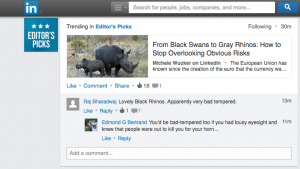
September 2, 2016
The European Union has known since the creation of the euro that the currency was bound for trouble if did not create workable ways to adjust for the wide differences among its national economies. Yet well into its second decade, its failure to do so threatens the currency’s future. The deadly defects in ignition switches and airbags at General Motors and Takata, and the emissions test fixing at Volkswagen were hardly a secret inside the companies, which covered them up instead of correcting them. Despite overwhelming scientific evidence of climate change caused by human activity, temperatures keep rising, with this July marking the hottest month ever recorded.
The reasons are different in each case, but the pattern is the same: humans consistently fail to respond to looming dangers, at astronomical costs in lives, money, reputation, and lost opportunities. Once you start looking at how many crises began with clear but essentially ignored warning signals, it becomes strikingly clear how often we miss opportunities to head off predictable problems.
Too many people take for granted that we cannot react in time to change the course of the disasters even when they are right in front of us. It’s well past time to challenge this assumption.